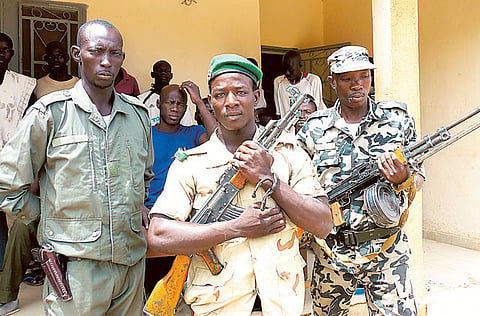Malian civilians form militia to combat extremists
Motley crew made up of students, jobless men and displaced civil servants

Soufouroulaye, Mali: Some barefoot, others wearing plastic shoes, a ragtag group of Malians shout “one, two, three!” as they throw up their knees high during a military drill.
The motley crew of would-be fighters is made up of students, young jobless men and displaced civil servants who fled Mali’s north when Islamic extremists occupied the desert area five months ago.
Now these men hope to return - fighting-fit and steeled for battle - to liberate the region they call home, which is in the grip of the jihadists who have enforced strict sharia law.
At the makeshift military camp in the small town of Soufouroulaye, near Mopti in central Mali, there are 285 militia volunteers in all joining in the drills, about 30 of them teenagers.
“I am a young volunteer,” says one of them, Oumar Toure. “I can’t see a part of my country under control of criminals and not go and fight.”
Mopti is the last big town en route to the north, an area larger than France or Texas that was seized by armed Islamist groups allied with Al Qaida in the Islamic Maghreb in March and April.
The extremists piggy-backed on a Tuareg separatist rebellion which started in January, fuelled by former mercenaries from Libya.
Together, the militants overwhelmed Mali’s poorly-equipped army, which then launched a coup in the southern capital Bamako that only heightened the chaos and sped up the rebel advance.
The Islamists soon pushed out their erstwhile Tuareg allies and have since enforced strict Islamic law while sparking regional and international fears of a new centre for radicalism in Africa.
While Mali’s embattled interim authorities have made little progress in wresting back the lost territory, several ‘self-defence’ militias have sprung up to win back the lost ground.
The group in Soufouroulaye includes sympathisers and members of Ganda Iso (Sons of the Land), a militia, historically backed by the army, that is known for its deadly attacks against lighter-skinned Tuareg or Arab Malians.
While the Malian state does not recognise these militias, the training is being carried out by regular soldiers.
“We call this camp the military base. I am the general inspector,” says Oumar Maiga, a soldier helping get the fighters into shape.
He says the boot camp has several phases: “Moral training so that the youth are toughened up, physical training, and military training with tactical exercises and shooting,” he said.
The volunteers also learn to shoot Kalashnikov assault rifles.
One of them, a left-handed youth, pulls the trigger, but nothing happens. The gun has not been loaded. “If you were in front of the enemy, you would be dead,” his instructor reprimands him.
In between training sessions, the youths gather in a hangar near the large field where they receive their instruction. Here women prepare them a lunch of rice and sauce in large pots.
“It is our contribution to the war,” says Awa Samake, one of the cooks. “We must help and encourage these youths, who are the pride of our country.
“Here sympathisers give a bit of food to these youths, others a bit of money. We are helping too.”
Security sources report similar groups training in other parts of Mopti and in the the southeast of the capital.
While not officially recognised, the groups appear to be tolerated by authorities.
“They aren’t military troops, but currently all who want to defend the country are welcome,” a military source said on condition of anonymity, adding that they could supplement Malian forces if need be.
Five months after the occupation, it is not clear when or if any military intervention will take place, with some hoping talks can resolve the crisis.
The option of an intervention from a 3,300-strong standby force of the Economic Community of West African States has been on the table for months, but “very little” has been done to implement this, Mali’s Defence Minister Yamoussa Camara admitted recently.
The UN has asked for more information on the size, means and plans of the proposed force before granting it a mandate.
Mali’s army chief of staff Ibrahima Dembele has said the national army - which is sorely in need of training and equipment - will play the lead role in ejecting the jihadists.
In Kona, also in the Mopti region, over 120 soldiers have recently been deployed to “reinforce the frontline”, say corroborating security sources.
Two Mi-24 combat helicopters have been acquired and tanks and other material are on their way to landlocked Mali after being blocked in Guinea. A new operational military post has also been set up in Sevare outside Mopti.
Several of the fiercely proud soldiers, still smarting from their rout in the north, have said they want to be at the vanguard of the reconquest of their land as a matter of “national pride”.
Sign up for the Daily Briefing
Get the latest news and updates straight to your inbox



